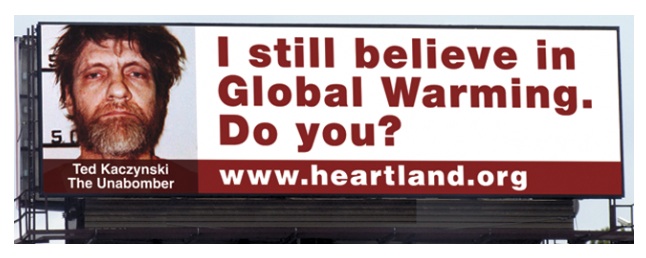New Billboards Compare Climate Scientists and Unabomber, Mass Murderers

Update, 5:23 p.m Eastern Time: In a statement by Heartland president Joseph Bast, the organization announced that it will be taking down the Unabomber billboard after only 24 hours. Bast wrote that the billboard was an "experiment" meant to "turn the tables" on climate-change advocates.
"We know that our billboard angered and disappointed many of Heartland’s friends and supporters, but we hope they understand what we were trying to do with this experiment," Bast wrote. "We do not apologize for running the ad, and we will continue to experiment with ways to communicate the 'realist' message on the climate."
The "experiment" resulted in "uncivil name-calling and disparagement" from climate-change scientists and activists, Bast complained.
Billboards popping up in the Chicago area compare climate change scientists and advocates with Unabomber Ted Kaczynski, murderer Charles Manson and Cuban dictator Fidel Castro.
The billboards, paid for the Heartland Institute, are designed to promote the organization's International Congress on Climate Change in Chicago later this month. The Heartland Institute describes itself as a nonprofit devoted to promoting free-market solutions for social and economic problems.
Climate scientists are already reacting to the actions, calling them "truly heinous" and the work of individuals who don't get real global-warming science. In addition, they say the billboards will only bring global-warming skeptics and those who support global warming further apart.
The first billboard, which went up along the Eisenhower Expressway in Maywood, Ill., today (May 4), according to a Heartland spokesperson, features a mug shot of Kaczynski with the words "I still believe in Global Warming. Do you?" and a Web address for the Heartland Institute. In a press release, the organization justified this juxtaposition by calling the support for human-caused global warming "nutty."
Sign up for the Live Science daily newsletter now
Get the world’s most fascinating discoveries delivered straight to your inbox.
"The point is that believing in global warming is not 'mainstream,' smart, or sophisticated," the organization wrote. "In fact, it is just the opposite of those things." [The Reality of Climate Change: 10 Myths Busted]
Climate scientists and mass murderers
Heartland further struck out at Peter Gleick, a prominent climate scientist who leaked internal Heartland documents online in February, revealing the Institute's fundraising efforts and plans to spread doubt about climate change. Heartland claims that one of the documents was faked, referring to the occurrence as "fakegate" in their release.
Gleick says the documents were anonymously mailed to him and he sought the other documents to verify the information. The information in the disputed document is backed up in the other documents, the veracity of which Heartland has not disputed. Individuals named in these documents have confirmed that they were working with Heartland on the plans.
Nevertheless, Heartland has sought to portray itself as on the defensive. In its most recent statement, the organization writes that the leaked memo scandal "revealed that the leaders of the global warming movement are willing to break the law and the rules of ethics to shut down scientific debate and implement their left-wing agendas."
"The people who still believe in man-made global warming are mostly on the radical fringe of society," the statement reads. "This is why the most prominent advocates of global warming aren’t scientists. They are murderers, tyrants, and madmen."
The target of their new campaign, Heartland spokesperson Jim Lakely said, is "people who aren't otherwise following the global-warming debate."
"Heartland is not usually in the provocation business, which is a common tactic of the global-warming alarmists," Lakely told LiveScience. "The reaction to this billboard has been interesting."
Will the Heartland Institute's billboards comparing climate change believers to mass murderers be effective at spreading doubt about climate change?
Scientists respond
Unsurprisingly, some of the scientists who research climate change took umbrage at this portrayal.
"This is only the latest in a long history of truly heinous actions by the Heartland Institute," said Michael Mann, the Pennsylvania State University climate scientist who originally published the famous "hockey stick" graph showing a rise in average global temperatures after the industrial revolution.
"The only thing I can think of here is that they are acting out of true desperation," Mann told LiveScience.
News of — and jokes about — the billboards quickly spread around the social-networking site Twitter.
"#Heartland Institute believes in gravity. SO DID HITLER," wrote Kevin Borgia, the director of the Illinois Wind Energy Coalition.
"Ted Kaczynsk[i] believes the world is round, and the Heartland Institute tries to persuade people that the world is flat," tweeted Ken Caldeira, an environmental scientist at the Carnegie Institution in Stanford, Calif.
Jason Samenow, a meteorologist at Washington Post, gave his response in a blog post on the newspaper's website.
"Their approach won't help different perspectives find common ground and work towards the most appropriate path forward," Samenow wrote. "But maybe that's what Heartland, in reality, is fighting against ..."
Editor's Note: The article was updated at 2:11 p.m. to correct Jason Samenow's professional affiliation.
You can follow Live Science senior writer Stephanie Pappas on Twitter @sipappas. Follow LiveScience for the latest in science news and discoveries on Twitter @livescience and on Facebook.

Stephanie Pappas is a contributing writer for Live Science, covering topics ranging from geoscience to archaeology to the human brain and behavior. She was previously a senior writer for Live Science but is now a freelancer based in Denver, Colorado, and regularly contributes to Scientific American and The Monitor, the monthly magazine of the American Psychological Association. Stephanie received a bachelor's degree in psychology from the University of South Carolina and a graduate certificate in science communication from the University of California, Santa Cruz.
